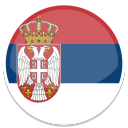
 塞尔维亚 eSIM 和 VPN 由 FlowVPN 提供
塞尔维亚 eSIM 和 VPN 由 FlowVPN 提供
Flow VPN 提供无限制的 塞尔维亚 VPN 服务,并为 塞尔维亚 和其他 59 个国家/地区提供 eSIM 数据包。
最近更新时间: 2025-07-15 13:38:15 CST
仅需 15 美元即可获得 塞尔维亚 和其他 59 个国家/地区的无限 VPN 和 1GB eSIM
去 塞尔维亚 吗?在 贝尔格莱德 度假吗?
使用 塞尔维亚 的 FlowVPN 全球 eSIM 上网,或连接到我们无限的 塞尔维亚 VPN 服务器。
FlowVPN 在 70 多个国家/地区设有 VPN 服务器,并为您的手机或平板电脑提供支持 4G 的全球 eSIM,可在 塞尔维亚 中使用。
立即注册即可获得每月 1.99 美元起的 VPN 访问权限,或仅需 15 美元起的VPN 和 eSIM 服务。
连接到 塞尔维亚 的 VPN 服务器
VPN 服务可从塞尔维亚访问,FlowVPN 在该地区拥有基础设施,可让您快速、无限制地访问互联网。我们的 VPN 服务器位于贝尔格莱德附近的数据中心。
立即使用 FlowVPN 访问 塞尔维亚 VPN 服务器
除位于塞尔维亚的服务器外,FlowVPN 还在 70 多个国家/地区设有数百台服务器,为您提供快速、无限制的 VPN 自由。
获取 塞尔维亚 的 VPN IP
FlowVPN 在 塞尔维亚 拥有多台服务器,让您可以访问本地 IP。通过 FlowVPN 的全球网络,获得对 塞尔维亚 的无限制 VPN 访问。
仅需 1.99 美元即可连接到 塞尔维亚 VPN 服务器!
使用 VPN 促销/优惠券代码COUNTRY-SERBIA注册 FlowVPN,首月仅需 1.99 美元 – 几乎是正常价格的一半!
塞尔维亚 VPN 服务
Flow VPN 通过位于 贝尔格莱德、塞尔维亚 附近的主机提供 VPN 服务。位于 贝尔格莱德 附近的服务器是我们高速全球网络的一部分,该网络覆盖 60 多个国家/地区的 100 多个地点。我们提供无限的 塞尔维亚 VPN 服务并提供免费试用,保护您的数据,让您可以私密安全地访问互联网。我们不会人为限制您的带宽。
我们在 塞尔维亚 拥有多个服务器,提供快速可靠的连接。
我们靠近 贝尔格莱德 (塞尔维亚) 的 VPN 服务器支持标准 VPN 协议,包括 WireGuard、PPTP、L2TP、IPSec、IKEv2、OpenVPN 和 SSH VPN。我们提供适用于 iPhone、macOS、Windows 和 Android 的客户端 –从您的 App Store 下载 FlowVPN 应用程序或立即注册。
塞尔维亚的互联网连接速度有多快?
塞尔维亚的互联网连接速度取决于多种因素,包括连接类型、位置和服务提供商。以下是一般概述:
- ADSL 和 VDSL:速度范围从 10 Mbps 到 50 Mbps。
- 光纤:提供更快的连接,通常范围从 50 Mbps 到 1 Gbps。
- 移动互联网(4G LTE):速度可能有所不同,但通常在 10 Mbps 到 100 Mbps 范围内。
- 5G 网络:仍处于早期部署,但在某些地区可以提供超过 1 Gbps 的速度。
总体而言,与农村地区相比,城市地区的互联网连接往往更好、更快。
塞尔维亚的互联网受到审查吗?
是的,塞尔维亚的互联网受到一定程度的审查和政府控制。尽管塞尔维亚总体上享有相对自由的媒体环境,但也存在内容过滤和其他形式限制的情况。需要考虑的关键点包括:
- 政府影响:众所周知,政府会对媒体和记者施加压力,这种压力可能会延伸到在线信息。
- 内容删除:有些批评政府或某些政治人物的网上内容被删除或限制。
- 监视:人们担心政府监视在线活动,包括监控通信和社交媒体。
- 法律约束:诽谤和诽谤法等法律机制可能会被用来限制网上言论自由。
塞尔维亚用户在网上访问和共享信息时务必注意这些事项。
塞尔维亚禁止色情吗?
是的,塞尔维亚禁止色情内容。以下是有关限制的一些要点:
- 法律地位:传播、制作和持有儿童色情制品是被严格禁止的,并将受到法律的惩处。
- 成人色情:虽然成人色情并非完全违法,但必须受到特定法规的控制以控制其传播和访问。
- 互联网监管:网络色情受到监控,并且可能限制访问某些网站,以防止非法内容的传播。
如需了解更多具体信息,建议参考塞尔维亚当地的法律法规。
塞尔维亚目前的互联网普及率是多少?
截至 2021 年,塞尔维亚目前的互联网普及率约为 79.97%。
塞尔维亚人对数据隐私有多担心?
塞尔维亚对数据隐私的担忧与全球一样日益加深。以下是几个关键点:
- 意识:随着数字化程度的提高,越来越多的人开始意识到数据隐私的重要性。
- 立法:塞尔维亚已经通过了与欧盟 GDPR 相一致的数据保护法,反映了政府对该问题的承认。
- 公众关注:调查显示,塞尔维亚相当一部分民众担心他们的数据如何被使用和存储。
- 网络安全事件:过去的事件和数据泄露加剧了人们对数据安全和隐私的担忧。
总体而言,虽然数据隐私已成为塞尔维亚关注的重大问题,但不同群体的意识水平和采取的行动有所不同。
塞尔维亚互联网用户面临哪些网络安全挑战?
塞尔维亚互联网用户面临的网络安全挑战包括:
- 网络钓鱼攻击:这些攻击通过伪装成可信实体来获取敏感信息的欺诈行为。
- 恶意软件:用户面临恶意软件的风险,这些软件可能会损坏或破坏计算机和网络的运行。
- 数据隐私:人们越来越关注保护个人和敏感数据免遭未经授权的访问。
- 勒索软件:这种类型的恶意软件会加密用户的数据并要求支付解密密钥的费用。
- 社会工程学:用于欺骗和操纵个人泄露机密信息的技术。
- 意识不足:用户网络安全意识普遍较低,可能导致漏洞。
- 过时的软件:使用过时的应用程序和操作系统可能会使用户面临已知的漏洞。
- 弱密码实践:经常使用弱密码或重复使用密码会增加未经授权访问的风险。
- 有针对性的攻击:针对塞尔维亚特定个人或组织的特定、复杂的攻击。
- 缺乏政府监管:管理网络安全实践的法规缺失或不一致。
塞尔维亚访问量最大的网站有哪些?
塞尔维亚访问量最大的网站:
- 谷歌(Google.rs 和 Google.com)
- YouTube
- N1信息
- 布利克
- 库里尔
- 维基百科
- 人力资源网
- 24sata.rs
塞尔维亚最受欢迎的社交媒体平台有哪些?
根据最新数据,塞尔维亚最受欢迎的社交媒体平台包括:
- Facebook——广泛用于与朋友联系和分享内容。
- Instagram——因照片和视频分享而广受欢迎,尤其是在年轻人群中。
- Viber——一款用于通讯的主流消息应用程序。
- YouTube——非常受欢迎的视频内容和流媒体。
- WhatsApp——消息传递和通话功能日益流行。
- Twitter——用于更新新闻和关注公众人物。
- TikTok——在青少年和年轻人中,短视频内容的爱好者群体迅速增长。
- LinkedIn——主要用于专业交流。
塞尔维亚 VPN 服务器状态
FlowVPN 运行的 塞尔维亚 VPN 服务器上次在以下地点进行了自动测试:2025-07-15 13:38:15 CST
此测试检查服务器的正常运行时间和可用性,以及验证所有服务是否按预期运行。
我们的服务器会不断受到监控,以确保没有问题。我们使用内部监控工具以及多个第三方提供商来确保定期检查和评估所有服务,以便我们识别任何潜在问题。
VPN 延迟 – Ping 速度测试
我们从位于 塞尔维亚 的 VPN 服务器到世界各地的服务器执行 ping 测试。我们在几乎所有位置都有多台服务器,但下面发布的结果是最新的测试结果。连接时,我们可能会根据您的 IP 路由从您所在的位置更快地优化路由。
| 塞尔维亚 VPN Ping 到目标服务器 | 延迟(毫秒) |
|---|---|
| Argentina | 261.220 |
| Armenia | 52.114 |
| Australia 1 | 287.114 |
| Australia 3 | 295.630 |
| Azerbaijan 2 | 112.330 |
| Azerbaijan | 101.225 |
| Bahrain | 130.694 |
| Bahrain (UK) | 125.496 |
| Bahrain (USA) | 124.335 |
| Belgium | 28.393 |
| Bolivia | 264.961 |
| Bosnia | 20.931 |
| Brazil | 209.579 |
| Canada (C) | 106.898 |
| Canada (E) | 112.610 |
| Canada (W) | 159.253 |
| Chile | 232.656 |
| Costa Rica | 195.054 |
| Croatia | 12.132 |
| Czech Republic 2 | 18.637 |
| Denmark | 28.689 |
| Ecuador | 180.598 |
| Estonia 2 | 41.813 |
| Finland 2 | 46.865 |
| France | 32.595 |
| Germany 1 | 31.850 |
| Germany 3 | 26.725 |
| Guatemala | 152.041 |
| Hong Kong 1 | 203.624 |
| Hong Kong 6 | 191.517 |
| Hungary | 21.343 |
| Indonesia | 200.524 |
| Ireland | 43.702 |
| Italy 2 | 43.410 |
| Kazakhstan 2 | 115.671 |
| Latvia 2 | 48.304 |
| Latvia | 48.101 |
| Liechtenstein | 32.345 |
| Lithuania 1 | 45.162 |
| Lithuania 2 | 45.485 |
| Macedonia | 62.981 |
| Malaysia 1 | 273.076 |
| Mexico | 162.215 |
| Moldova | 55.034 |
| Netherlands | 30.499 |
| New Zealand | 295.628 |
| Nicaragua | 168.304 |
| Norway | 46.233 |
| Panama | 169.866 |
| Peru | 202.936 |
| Philippines | 321.139 |
| Poland 3 | 50.533 |
| Portugal | 61.517 |
| Puerto Rico | 136.632 |
| Romania | 21.282 |
| Slovakia | 20.382 |
| South Africa | 190.934 |
| South Korea 2 | 244.454 |
| Spain 1 | 59.910 |
| Spain 2 | 58.819 |
| Sweden 1 | 59.854 |
| Sweden XIP | 38.599 |
| Switzerland | 30.082 |
| Taiwan 3 | 230.210 |
| Taiwan 4 | 318.356 |
| Taiwan 5 | 221.206 |
| Ukraine | 40.848 |
| United States Central | 157.872 |
| United States Hawaii | 221.988 |
| United States LA | 181.954 |
| USA via Singapore | 177.960 |
| USA via Taiwan | 310.750 |
塞尔维亚事实
塞尔维亚顶级域名: .rs
货币:第纳尔
